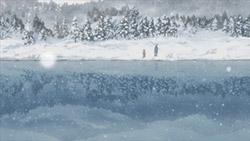 |
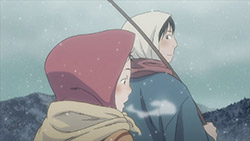 |
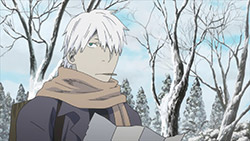 |
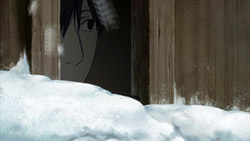 |
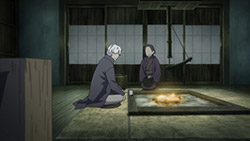 |
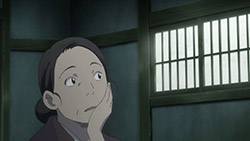 |
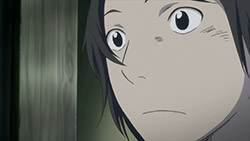 |
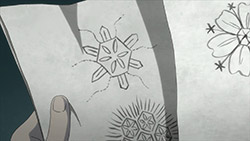 |
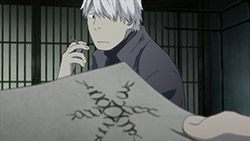 |
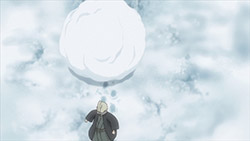 |
 |
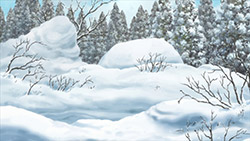 |
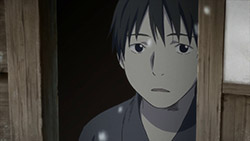 |
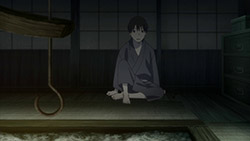 |
 |
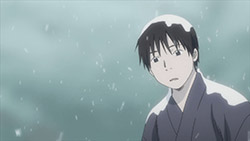 |
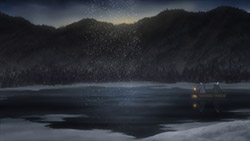 |
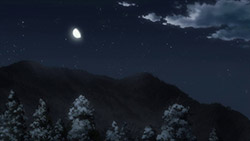 |
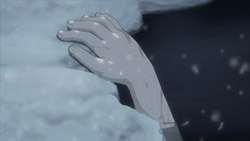 |
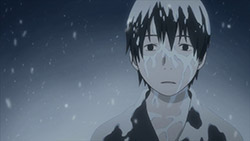 |
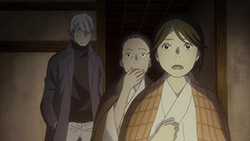 |
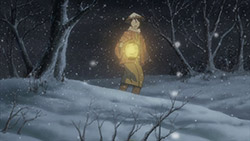 |
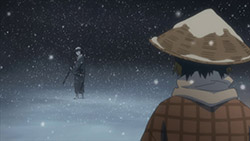 |
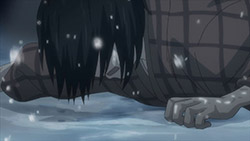 |
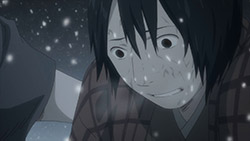 |
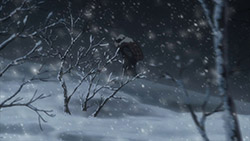 |
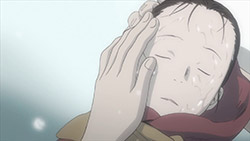 |
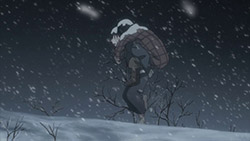 |
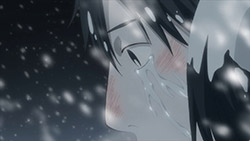 |
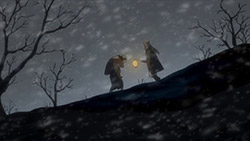 |
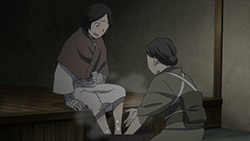 |
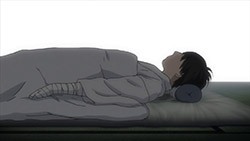 |
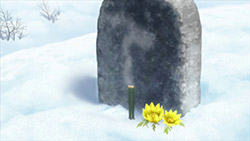 |
 |
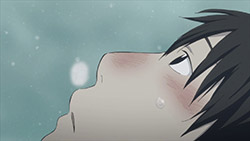 |
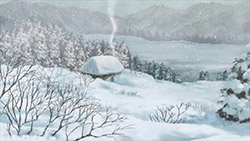 |
「雪 の 下」 (Yuki no Shita)
“Beneath the Snow”
If there’s such a thing as a quintessential Mushishi episode, that might have been it.
Mushishi is a series that has many sides to it, and they reveal themselves only if you’re patient and watch it for an extended period. It’s not the sort of show that flashes its entire repertoire in any one episode – rather, like snowflakes, each is different in form. If I were to compare it to a meal, rather than a stew where the flavors meld together so that you get some of everything in every mouthful, Mushishi is a like a sampler of sashimi, where every bite is a completely distinct and different experience.
“Beneath the Snow” represents a couple of the most compelling faces of Mushishi as far as I’m concerned. To begin with, there’s just something about this series and snow. Mushishi seems to be at its most beautiful and most primal when Ginko is immersed in a mountainous landscape in winter, and Artland’s drawing style (and manga Urushibara Yuki’s) especially suited to depicting them. And in terms of tone, this was a story which presents quiet, resigned sadness – again, only one of many that the series spans, but one of the ones that seems to fit it most naturally. After the gentle re-entry the first two episodes provided, we’re starting to see the series return to some darker emotional shading – though this is by no means as dark as it gets.
What’s interesting about Mushishi is that it generally presents tragic events with a considerable amount of detachment, yet in doing so retains a good deal of their emotional power. I’ve referred to this series as Natsume Yuujinchou’s emotionally cooler cousin, and I think that comes across very plainly in this chapter. Obviously that series would have depicted the events that transpired here in a much different way, and no doubt been devastating in the process. But in Mushishi even the characters to whom such events are happening rarely show much overt emotion. It should feel as cold as the hands and feet of this week’s protagonist, but somehow it doesn’t – it still touches us in a very fundamental way. To me the emotional buttons being pushed are different than with a series like Natsume, but the result is no less powerful.
The aforementioned protagonist this week is Toki (Ueda Shinichirou), an adolescent in the small mountain village which Ginko visits in pursuit of interesting “snow mushi“. His best friend (and more) is Tae (Misaki Yatabe) and he has a younger sister named Sachi (Komagata Rumi Nana) who falls through the ice on the lake at the edge of the village early one winter, and dies in Toki’s arms after he pulls her from the water. From that day forward Toki endures a strange condition – snow falls on him wherever he goes, he’s never cold, and any warmth causes him to feel as if his skin is on fire. This is the result of the Tokoyuki (“Always Snow”) mushi, which possesses an animal and slowly leeches the warmth from it until the Spring, when it moves on and leaves the host behind.
As is so often the case in Mushishi there’s a strong metaphorical component to these fables, for Toki grows as cold emotionally after his sister’s death (which he wrongfully feels responsible for) as he is physically. And when he himself falls through the ice one frigid night, it’s the Tokoyuki which keep him alive – forming a protective layer of “snow” around him even under the water which keeps Toki alive until the cracking of the ice wakes him up. There’s little effort to disguise the symbolism here – they way our emotional walls both protect us and put us at risk, allow us to continue living even as they isolate us. And how it’s sometimes the warmth of another person that finally brings those walls down, leaving us damaged and exposed but somehow more alive than we were before.
Mushishi is, as always, a meditative experience. If you’ve ever tried to understand meditation by reading about it, you know how difficult it is to capture Mushishi by writing about it. You don’t watch Mushishi so much as experience it, and each story it tells needs no elaboration or explanation – it simply is what it is. People often ask me if they need to watch the first series before this one, and I think it’s both a difficult question to answer and the wrong question altogether. It’s not as though one needs to see earlier episodes to understand the current episode of Mushishi, but they aren’t meant to be experienced as a stand-alone – they’re a part of a larger picture which can only be fully appreciated when one experiences it in its entirety. Watching a single Mushishi episode without watching all of Mushishi is like a Monet where only the color blue is visible – Monet was certainly adept at his usage of blue, but you’re not looking at the picture that was in his mind when he created it.
End Card
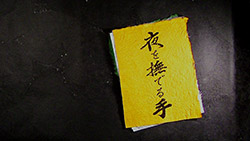 |

Very impressive episode. It indeed feels like the episode is presented in a very “neutral” and understated manner, giving the viewer a kind of omniscient and serene position. I kind of zoned out of everything else around me watching the episode. Such a good experience in between the hectic days.
On another hand….isn’t it “Toki” instead of “Taki”?
Tokidoki.
The irony was beautifully done. The moment Toki feels the frigid coldness, we know his heart has thawed.
I haven’t seen a more perfect audience surrogate than Ginko. He’s a stranger to every one of these characters, so the stakes should be low, the mood should be detached, and yet, we find ourselves quietly moved.
Was rather scared myself when i thought Tae was going to be the next to die after Sachi, thankfully it didn’t happen.
Same here. While Mushishi is not one to go into dramatics, it has also never been hesitant to let tragedy happen when the time comes for it.
I was drawn in by this series – it’s enjoyably different.
The OP/ED and soundtrack are well done as well.
Another well-executed episode!! The art was really, really beautiful, but I liked the symbolism best. Watching Mushishi always makes me think hard and reflect on life itself.
So I gave this anime the three episode rule since I never did watch the original series but I gotta say this series is definitely unique and I will keep watching.
I really highly recommend watching the first season in the meanwhile while you are watching this season. It’s as every bit as beautiful as you’ve seen so far.
Mushishi’s masterful ability at capturing human emotion was on a much higher plane than I have ever seen this episode. Of course, no surprise, when you are capturing grief and love in its most natural and elegant form as Yuki Urushibara masterfully did, I have absolutely no qualms with calling this the quintessential episode of this series. In fact, this is the greatest episode I have seen so far in this year’s Anime cycle.
I felt as if I was freezing with the characters when watching this episode…and I live in beautiful California!